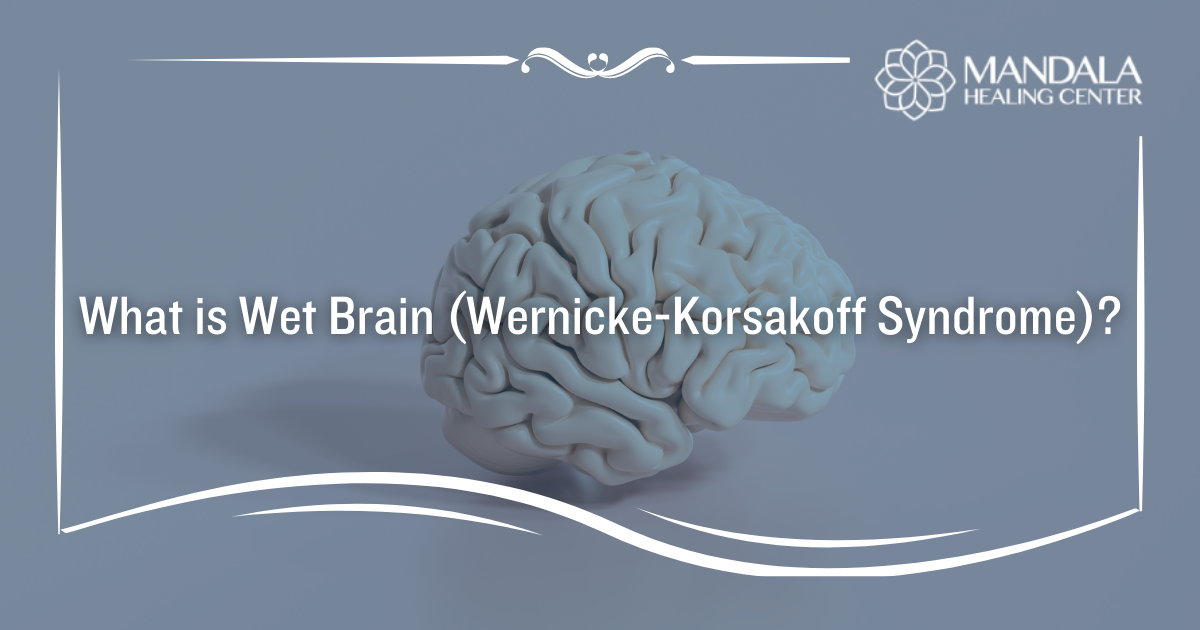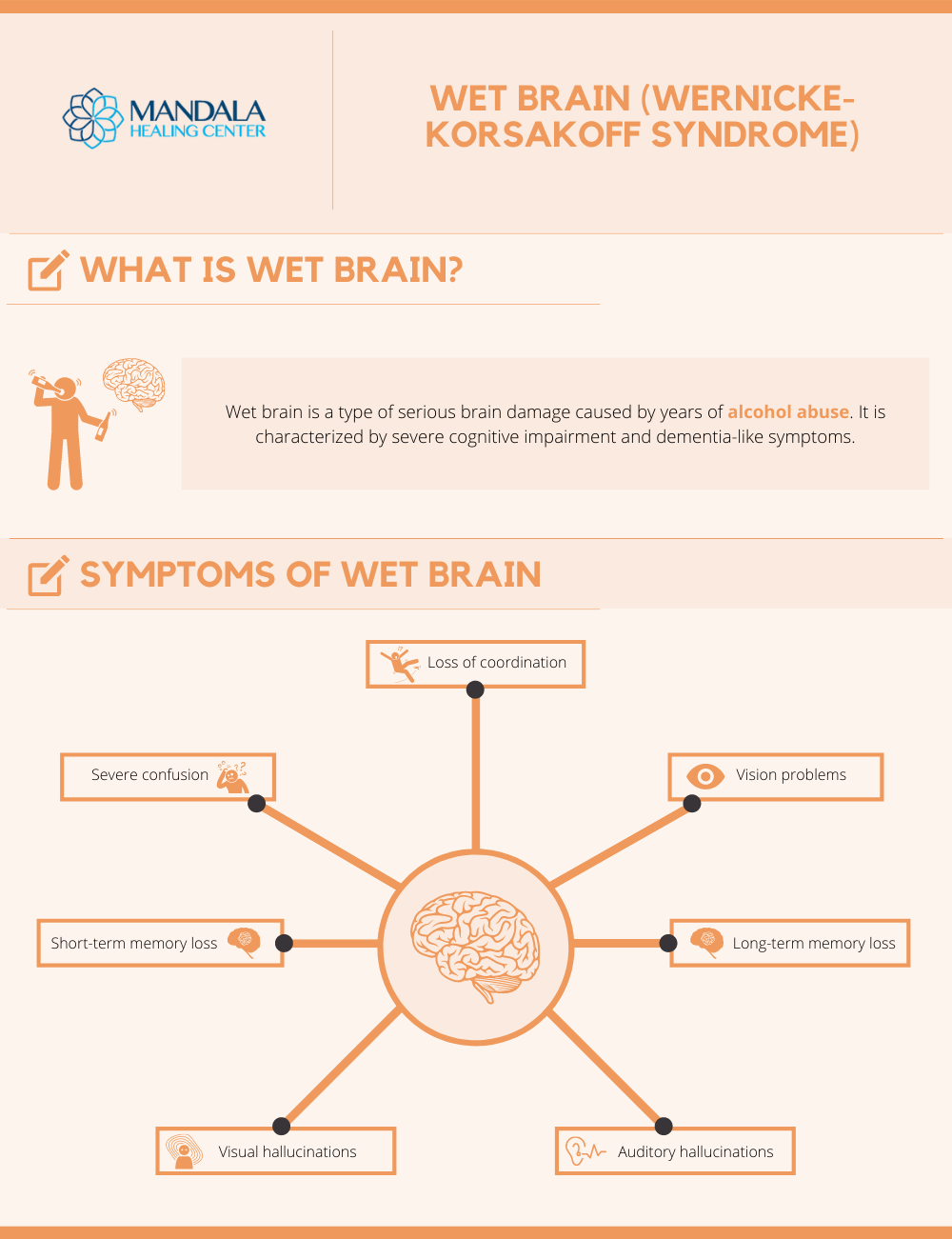It is possible for anyone to develop an addiction to alcohol, even without a personal or family history of alcohol abuse. Millions of people in the United States struggle with an unhealthy relationship with alcohol. For some, this might mean binge drinking occasionally. For others, it might mean drinking more than recommended every day. Left untreated, unhealthy drinking can develop into a physical dependence or addiction.
An untreated addiction often causes dangerous or deadly consequences. People who live with alcoholism may suffer severe damage to their physical and mental health, strain in their relationships, and financial or legal problems.
One serious physical effect of prolonged, heavy drinking is Wernicke-Korsakoff Syndrome–also called “wet brain”. While this condition is rare, it is a real and serious consequence of untreated alcoholism.
If you or someone you love struggle with an unhealthy relationship with alcohol, please do not wait to get treatment. The longer you wait, the more likely it becomes that you will experience severe consequences. Reach out to the staff at the Mandala Healing Center for more information about preventing wet brain and learning how to live a healthy, sober lifestyle.
What Are the Symptoms of Wet Brain?
Anyone who drinks heavily for a long time can develop wet brain. However, because this condition usually develops after many years of heavy drinking, it is more common for people between 30 and 70 years of age to suffer from it.[1]
The symptoms of wet brain usually start quickly and are obvious. If you or someone you love exhibit any of these symptoms after drinking heavily for years, it is critical that you get medical care right away.[2]
- Severe confusion
- Loss of coordination, including the inability to walk
- Involuntary eye movements, double vision, or other vision problems
- Short-term memory loss–usually the inability to form new memories or remember what has happened recently
- Long-term memory loss–not remembering people or events that took place in the past
- Visual and auditory hallucinations
About 20% of people who develop wet brain will experience a decrease in their brain activity that is significant enough to cause a coma or death.[3] Getting treatment for wet brain as soon as you recognize symptoms can reduce your likelihood of life-threatening problems.
What Causes Wet Brain?
Wet brain is a condition that develops after someone drinks alcohol heavily for many years. It is caused by a Thiamine (vitamin B1) deficiency otherwise known as Wernicke’s Encephalopathy.[1] While people with other health conditions such as eating disorders or certain cancers can develop Wernicke-Korsakoff syndrome, heavy drinking is the leading cause of this condition.
The brain relies on Thiamine to work. Thiamine allows the brain to break down sugar and use it for energy. Alcohol prevents the brain from absorbing and storing Thiamine. Without enough of this essential vitamin, the brain can’t function properly. More importantly, without treatment, Wernicke’s Encephalopathy can turn into Wernicke-Korsakoff Syndrome or “wet brain.”
If left untreated, wet brain can cause permanent lesions and scars on the brain. This damage lasts for the rest of the person’s life and can cause significant impairments.
Understanding the Effects of Wernicke-Korsakoff Syndrome
Many people who develop Wernicke-Korsakoff Syndrome will end up with the same functioning as other dementia patients. About a quarter of people with the condition will require long-term care in a nursing home or other supportive setting.[3]
Wernicke-Korsakoff Syndrome has two distinct phases: Wernicke Encephalopathy and Korsakoff Syndrome. During the development of Wernicke Encephalopathy, people may experience a loss of coordination and confusion. When recognized early, people can get medical treatment, including Thiamine supplements, that can prevent long-term brain damage.
Once someone has developed Korsakoff Syndrome, the damage caused by the Thiamine deficiency is permanent. They may experience psychosis and lifelong memory issues that can not be treated or cured.[4]
Wernicke-Korsakoff Syndrome is rare. About 2% of the population will ever develop it. It is much more likely that someone who drinks heavily for a long time will develop life-threatening damage to their liver or pancreas. However, understanding this condition can help you recognize the symptoms if they occur and get immediate treatment.
The most effective way to prevent wet brain is to get treatment for alcoholism before you experience life-threatening consequences. If you have an unhealthy relationship with alcohol, start a substance abuse treatment program as soon as possible so that you can live the healthy, fulfilling life you deserve.
Find Help for Alcoholism Today
If you or someone you love need support and treatment to overcome an addiction to drugs or alcohol, you are not alone. Reach out to the staff at the Mandala Healing Center for more information about the programs we offer.
We believe that anyone can recover from addiction if they have the right support. That is why we carefully design treatment programs that empower people in their journey out of addiction. Don’t wait another day for the life-changing treatment you deserve. Call now to get started.
References:













